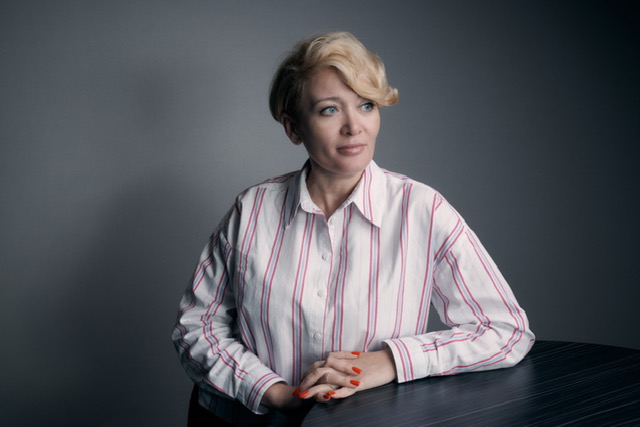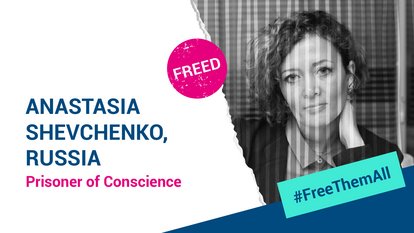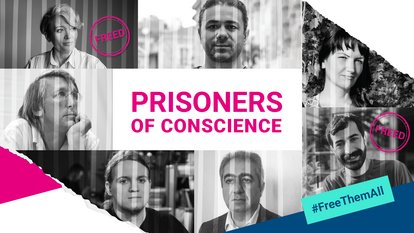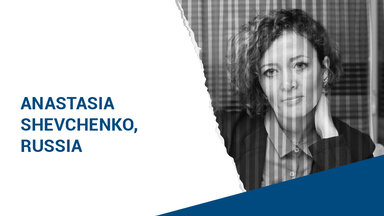Human Rights
Interview with Prisoner of Conscience: Anastasia Shevchenko

Anastasia Shevchenko
Russian activist Anastasia Shevchenko spent two years under house arrest after being found guilty of her alleged involvement with Open Russia Movement, a pro-democracy nonprofit organisation which was blacklisted in 2017. She was the first person to be convicted under the so-called “undesirable organisations” law which aims to ban foreign-funded nonprofits. In 2021, a Russian court gave Shevchenko a suspended sentence of four years. A year later she fled Russia with her family and is currently living in Lithuania.
Q: Could you tell me what it means to be an activist in Russia, and how it has changed since you started in 2012?
A: I think activists have always been enemies of the regime. You are protesting, you are supporting, you are volunteering. But it's very difficult to see any results because the situation in the country is getting worse and worse. Over the years, the regime’s camp of enemies expanded to include more and more people: journalists, artists, poets, and whoever else might be one. All of us are enemies. All of us are undesirable.
Even now, being abroad, I feel like I can’t breathe normally because of all that is happening in my country and because I can’t separate myself from my country. I hate when people talk about Russians inside the country and Russians outside the country, like these are two different types of people. But we are not different. We actually need each other. We support people who are in the country, and they really need our support. It's like we share one body and can’t be separated. We are all unlucky; some ended up in prison, some in exile, and some are silenced at home.
I think that activism can really change the world. In the past I felt like I would love to be a politician, but then I decided that being a political activist is even better. You are always on the ground, you know all the problems, and you are trying to help people. When you are an activist, sometimes you just need people to say: “Aw, thank you for what you are doing, because you are doing it for us.” But in Russia, being an activist became a sort of crime. So, we would never hear any thank you, just threats and hate speech in response.
Q: You were arrested in 2019 and spent two years under house arrest. Tell us a little bit about the case and what happened.
A: Before the criminal case I was twice fined for being a member of the Open Russia movement; once because I took part in a debate aired on local TV and another time when I participated in a seminar because I wanted to run for office. I was accused of receiving money from abroad. In 2019 I participated in a political rally in support of political prisoners and victims of repression. I was standing with a flag which read: “Enough of him”, referring to Putin. Then the police searched my apartment and detained me for two days without providing any water. It was a very humiliating experience. I spent two years under house arrest.
This was the first criminal case under the so-called “undesirable organisations” law. But it was only a year later that we found out that they had installed a video camera hidden in the air conditioning unit prior to my arrest. They have been watching me in my bedroom for six months and there are more than 30 discs with video footage from my bedroom. I was also detained several times by police for different reasons – like glueing posters or stickers against Putin in the city center.
The fact that during my house arrest my eldest daughter could not live with me, though she needed my help and assistance 24/7, was very painful. I tried to explain to the authorities, but it seems like they didn't want to hear me. The judge was even smiling when I told him my daughter would die without me. And she died. They let me see her only after her heart had stopped twice. She was already unconscious when I arrived. She died an hour later.
Maybe she was the reason why I wasn't sent to jail. She kind of saved me. Two years later the prosecutor demanded five years of jail for me. Eventually, the judge gave me a suspended sentence of four.
Q: What is the cost of opposing Putin?
A: Unfortunately, we all paid a very high price for criticizing Putin. The Open Russia movement, for example, was shut down. More people got arrested. Not to mention my daughter's life…So many people had to move abroad, to live in exile. That was just the beginning. So many organisations were labeled as extremist. All of us are either terrorists, extremists, or undesirable foreign agents.
Q: Activism could be a lonely endeavor. What gave you hope all these years?
A: My children, I watch them growing up absolutely free and strong. I know what they want and what country they would like to live in. I also admire people who help children in need. Sometimes, when nothing else helps, I watch sports because it gives me motivation, as sports often is about overcoming different challenges.
Q: How do you see Russia now since Putin invaded Ukraine in 2021?
A: Today Russia is very different. I have friends in Moscow, and they send me videos from time to time – they show life going on as usual or at least that people pretend that nothing has happened. Restaurants are full of people. The city is very beautifully decorated for Christmas and New Year. Children are laughing outside and it all looks normal. But all of it is like a façade. All of it is fake. It's an entire fake country. There are no illusions about democracy, about freedom of speech, about freedom of choice. Everybody knows who is responsible for that. But people live in fear. And that's what I see.
My hometown is in the Rostov region, which is very close to Ukraine. You see many refugees and military men. Many people died in this war, so you just can't pretend like nothing happened.
I watch videos from Ukraine, where civilians were forced to take arms – like yoga instructors and volunteers in dog shelters – now they are fighting the Russian army, and it is awful that we made all these people suffer and die. It's all our fault. For years we are going to bear the burden of responsibility and guilt. For years and years. We should never forget what is going on right now. Russian soldiers are in Ukraine now, killing innocent people, for nothing, for no reason. Nothing can justify this war.
"They have been watching me in my bedroom for six months and there are more than 30 discs with video footage from my bedroom. I was also detained several times by police for different reasons – like glueing posters or stickers against Putin in the city center."
Q: You are writing letters to political prisoners. What do you tell them?
A: They do not have access to information, because all independent media left the country a while ago. Some of the prisoners can watch TV, but it's usually propaganda TV channels. And that's it. Letters are the only way for them to get real news about the outside world. So my main goal is to deliver to them news just about everything. I know how hard it is for activists to be isolated, especially in prison, and not have access to information.
Many Ukrainian prisoners of war are sent to Russian jails. They need support even more than Russian political prisoners because they are all alone. They don't have lawyers, they don't get food deliveries, they don't have clothes, they don't have money, nor information from relatives. This morning I was in tears. I was about to send a letter to a Ukrainian soldier from his mother. Ukrainian families cannot send letters to Russian prisons, so they need a local to help them. So, I write the letters on their behalf. It's so heartbreaking. When a mom says how she recalls the time when her son was a child, when he went to the poor and made them porridge, the time when he brought her flowers. But now her son has been imprisoned in another country, he has been tortured... There are thousands of prisoners like that. They really need our support. They don't need news, they just need not to be forgotten.
Q: Now that you have fled the country, what do you tell your children? Why is activism important?
I don't need to explain. They know it all. I always speak with them openly about what I do, why I do it. One day, my daughter told me: If you were not an activist, you wouldn't be you. My children aid my efforts to help other people. Sometimes I ask my daughter to help me with writing emails to prisoners. At first, she said “No”, she did not have time. But as soon as she started reading the messages from prison, she was ready to do everything.
My children just worry about me a lot because they know activism could be risky, not as risky as it was in Russia, but still. I'm very sad about the fact that they don't want to live in Russia.
Q: Do you think your daughter will fall in your footsteps?
A: My daughter studies political science at the university. We often have conversations on different topics, like the relationship between Azerbaijan and the EU, for example, or, repression of the LGBTQ community, and so on and so forth. She is learning what I never had a chance to learn. I was just an activist because I made this choice. She is going to be a professional activist. I'm very proud of her.
Q: What is the Russia you dream coming back to and living in?
A: It is the same country I left. I would like to come back today, not dream about something ideal, beautiful and free. I want to go back home and work to change it for better. But when you know that you are on a wanted list and when you have this document which clearly says that you are going to be arrested immediately upon your return, you just can't go back. I can’t do it because my children just won't forgive me if I get arrested again.
I do not idealize my country. I know we have hard times ahead of us and that there will be many years of turbulence and no guarantee that we are going to become a democratic country. But any kind of opportunity to be there and to change it is greatly welcome.

Prisoners of Conscience

We feature select few prisoners of conscience out of the many in East and Southeast Europe. One political prisoner is one too many.
Find out who the other political prisoners are #PrisonersofConscience #FreeThemAll and in the special Focus on our website.
Find the first feature story of Anastasia below.
Prisoner of Conscience: Anastasia Shevchenko
